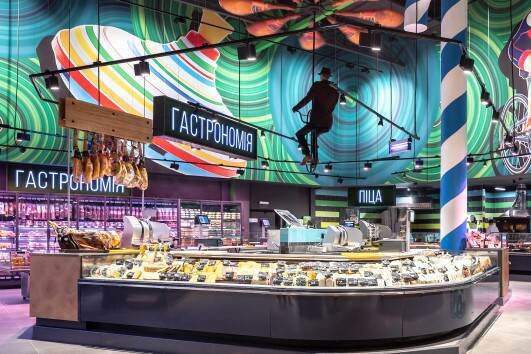EBRD and donors help Ukrainian supermarket chain Silpo adopt innovative technologies
Avoiding plastic wrap, installing energy-efficient fridges, recycling materials wherever possible … these are only three of the many things a supermarket can do to protect the planet.
Thanks to the backing of the EBRD and its donors, consumers in Ukraine now have another way to enjoy safer and more environmentally friendly shopping ‒ the Silpo Recycling supermarket, one of the few supermarkets in the country to adopt the very latest in green technology.
Silpo is part of Fozzy Group, one of Ukraine’s largest industrial trading groups and a leading multiformat retailer, with brands such as Silpo, Fora and Fozzy C&C and almost 700 outlets nationwide.
“Fozzy Group has been on the sustainable development path for a long time, introducing numerous ecological initiatives at Silpo,” says Bohdan Deiko, Silpo’s Lead Energy Audit Engineer. “However, it was the EBRD’s support that inspired us to open our first ‘green’ store.”
In its latest store initiative, Silpo has put in place nearly every technology and practice imaginable to boost resource and energy efficiency. With freon-free refrigerators, onsite renewable electricity generation and various waste-reduction activities, the green store is the only one in Ukraine to adhere to the Building Research Establishment Environmental Assessment Method (BREEAM) principles for constructing environmentally sustainable buildings.
“One of our most innovative technologies is that, instead of freon-based cooling units, we use carbon dioxide-based ones,” Mr Deiko says. “Thus, CO2 is not released into the atmosphere and the solution is more energy efficient overall. When being environmentally friendly, it’s best to take a comprehensive approach. When choosing the cooling units, for instance, we paid attention to even the smallest detail and looked for cutting-edge solutions in everything.”
A US$ 60 million EBRD loan has gone towards opening or renovating 41 Silpo supermarkets, including the new green store, as well as 29 Fora convenience stores, with a focus on energy- and resource-efficient technologies.
The loan was supported by the EBRD’s Finance and Technology Transfer Centre for Climate Change (FINTECC) programme, with a grant provided by the Global Environment Facility (GEF). The European Union and Japan provided further grant funding.
“Our collaboration with the EBRD has made us more socially responsible and environment friendly, not just when it comes to our green store, but also in our management approaches,” Mr Deiko emphasises. “Importantly, in addition to financial support, the EBRD provided comprehensive advice on integrating a sustainable facility and resource management system.”

How green is your local supermarket?
Ahead of World Consumer Rights Day on 15 March, the EBRD conducted several polls on social media, asking people from all over the world to evaluate the environmental standards of their local supermarket, as well as their own consumer habits. They also had the opportunity to make recommendations on how a supermarket could become greener.
World Consumer Rights Day is an annual event dedicated to highlighting the power of consumers and their right to a fair, safe and sustainable marketplace. This year’s theme is tackling plastic pollution.
62.2 per cent of people who responded to our surveys said that their local supermarket supported sustainable farming, and 54.8 per cent thought that it didn’t use too much plastic packaging.
66.2 per cent said that they used their own reusable bags when grocery shopping, while only 17.5 per cent chose plastic bags.
Among their tips on how we can make our visit to the supermarket greener were:
- Meal planning, come with a shopping list to avoid buying things you don’t need;
- Always bring your own reusable bag;
- Walk or cycle to the supermarket.
Reducing waste
Minimising waste, for example “by ordering less fresh produce” featured among EBRD followers’ recommendations on how a supermarket could become greener. Indeed, this is one of the first things Silpo did.
Unlike most of its competitors, Silpo Recycling does not pack its fresh produce, selling it in bulk to minimise packaging waste. Customers can also use their own reusable packaging. Moreover, the supermarket only uses biodegradable and reusable bags alongside other recycled materials, such as shopping carts made from fish nets and ropes.
The company has also installed a recycling station, where customers can bring recyclable materials, such as paper, glass, plastics and metal, and receive vouchers in return to spend in the store.
Silpo has even replaced its paper price tags with e-ink solutions.
This year, Fozzy Group has been working with the EBRD and other international experts to review its supply chains. The main aim of the review is to identify opportunities for waste reduction.
“Apart from being obviously environment friendly, all of the green solutions we use are an excellent way of communicating our stance to people and engaging them in the environmental movement,” Mr Deiko says, highlighting how important it is for supermarkets to lead by example and encourage consumers to adopt greener behaviour.
Use of renewables and energy-efficiency solutions
Silpo has installed 664 photovoltaic panels on the green store’s roof, which it uses to generate maximum electricity at peak times. The store’s external lighting is also powered by solar panels on autonomous time lapse, complemented by batteries if necessary.
In addition, the parking area near the store has six charging stations for electric vehicles.
“Some of the solutions we use are not exactly hi-tech, but they can still be considered innovative,” Mr Deiko says. “For instance, we have roofed our bicycle parking. Though it’s a simple idea, it is somehow hard to come by in everyday life. We encourage our visitors to use environmentally friendly transport, so it’s up to us to create the best conditions for that.”
The company is also using special doors on its refrigeration, cooling and heating units to reduce cold and heat loss and it has upgraded its building insulation.
*The polls were conducted on the EBRD’s social media accounts (Instagram, LinkedIn and Twitter) between 13 and 15 March. In total, more than 700 accounts took part.